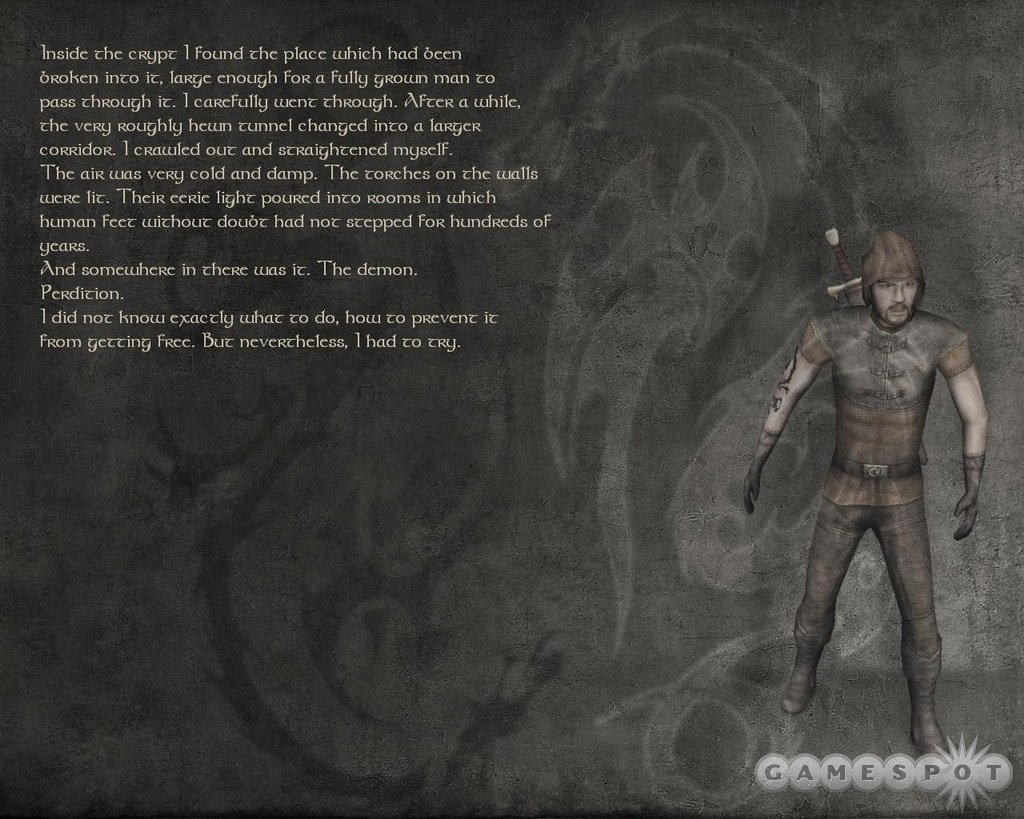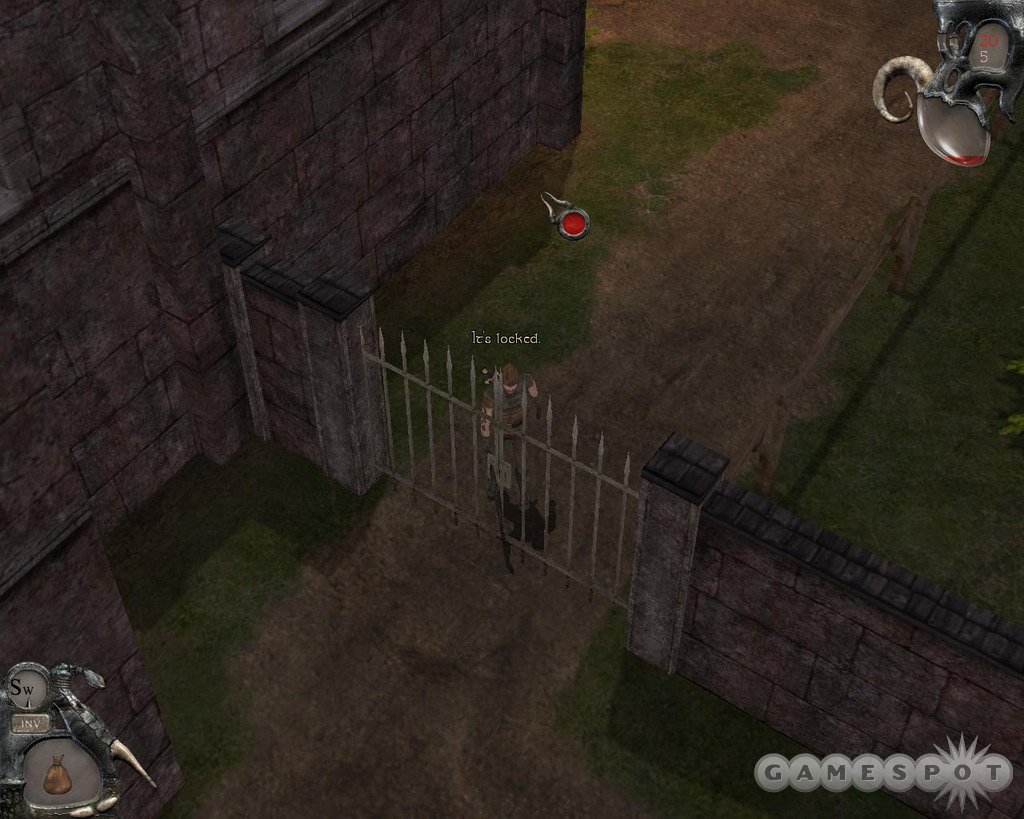If you've ever been stuck in a small, boring town with little to do but talk to unpleasant locals and pick weeds, then you have a pretty good idea of what it's like to play Daemonica. This is an adventure game first and foremost, though the puzzles are few and mild at best, and the inclusion of a potion-making element and a real-time combat system--while laudable in concept--ultimately do little to abate the tedium.

You play the role of Nicholas, a brooding tattooed man in medieval England, living the life of a "hunter," someone who uses their knowledge of potions, the afterlife, and the ancient language of Daemonica to hunt down killers. His line of work brings him to Cavorn, a truly miserable village with murky skies, drab buildings, and a borderline-hostile population. Here, a young undertaker has been freshly hanged by a craven bully of a mayor for the savage murder of the undertaker's fiancé as well as a reclusive couple. Though the mayor himself summoned you to basically back up his shortsighted, impulsive actions, it's quickly apparent that the undertaker is not the killer, especially once more locals start coming up missing. So, through lots of stilted conversations, randomly wandering the city-block-sized village, some light alchemy, and the occasional swordfight, it's up to you to figure out just what exactly is going on in Cavorn.
There is a lot of talking in Daemonica--too much, in fact. Nearly all of your interaction with other characters starts and ends with a dialogue tree, and the game's not afraid to pack on the exposition during conversation. Even for its paltry size, the village of Cavorn is pretty underpopulated, and you'll end up speaking to maybe a dozen different people over the entire course of the game. Some of the characterizations are pretty pronounced, but there's not much for sympathetic or even mildly likable characters. The actual conversations are usually text-only affairs, though there are also plenty of voiced sequences where an embarrassingly miscast Nicholas drones on and on, almost defying you to find something redeeming about the character. As a story-driven game, Daemonica fails to deliver a very compelling story or cast of characters.
The best trick a hunter can perform is to brew up a potion known as soulgreep, which lets the drinker commune with the dead, who are often quite knowledgeable about the details of their own demise. You'll concoct several different types of potions over the course of the game, and they all require you to harvest specific plants you'll find around the village. This could have been a fun and organic addition, but there are only six different kinds of plants to be found, and after a few hours of wandering, it becomes apparent that the plants only have a few different places to grow. Since the game gives you clear and precise instructions on how to make the different types of potions you'll need, of which there are really only three or four, the whole process is just tiresome for most of the time.
The soulgreep potion just about kills you when you drink it, sending you into a special chamber in the afterworld where you can request the presence of a specific soul. This happens several times over the course of the game, and it serves as a recurring puzzle, since you need to know how the person died, what motivated them in life, and what sign they were born under. Though working out the kinks of how the system works can take you a few tries the first time, knowing what information you need to be looking out for, plus the fact that your journal will retain any pertinent details that you might not have picked up on during one of those incredibly dull conversations, makes each subsequent journey into death a total cakewalk. And, if worse comes to worst, the number of options you have to choose from in each scenario is so limited that it's not that tough to just brute-force your way through.
The game also throws a few swordfights at you, which are always one-on-one affairs that require you to just hold the spacebar to block incoming attacks, then click repeatedly on your mouse to dish out sword slashes. There really isn't any more depth or strategy to the action than that, and it's easily the most tacked-on feature in the game. Daemonica touts that it has alternate endings, but in practice, all you get is some anticlimactic scrolling text, and the decisions you make that affect the ending are so late in the game that you need not alter your gameplay style dramatically to see them all.

Though there are a few subtle puzzles for you to get snagged up on, it will likely take well less than 10 hours to get through Daemonica, but the game's generally unpleasant presentation will make it feel like much longer. Despite the morbid, supernatural nature of Daemonica, the world itself looks flat and bland, and it's so small that you'll know the whole thing front to back before it's all over. There are only a few different unique character models that get recycled a few times, all of them uniformly crude in design and stiff and mechanical in animation. As mentioned before, the voice actor for Nicholas is quite bad, sounding like someone trying very hard to do a stern British accent and failing miserably. There are a few pieces of music that kick in pretty much randomly. Some of the music is actually okay for setting the mood at first, but it all repeats so often that the effect wears off quickly.
There are some decent ideas at the heart of Demonica. The macabre premise of talking to the dead to punish the living, conjuring useful potions out of found ingredients, and mixing adventure-game dialogue and puzzle conventions with real-time combat are all fine ideas, but in practice, the result is something too dull for the average player and too easy for the weathered adventure game enthusiast.